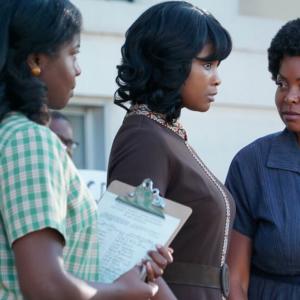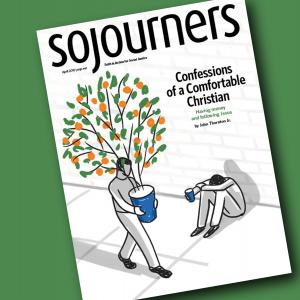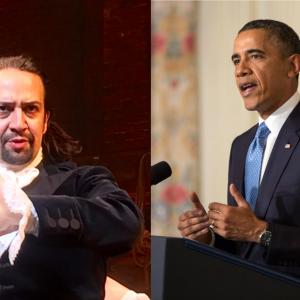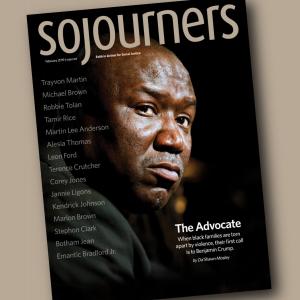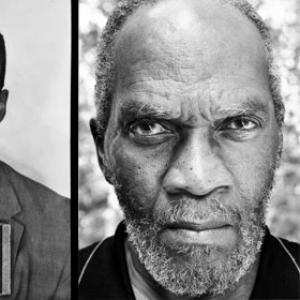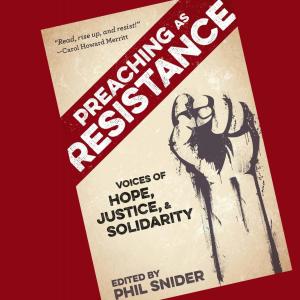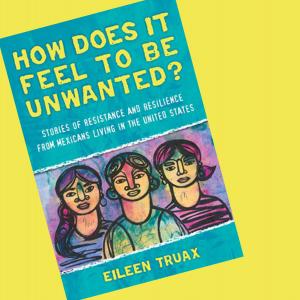Posts By This Author
From the Editors: Changing Our Lenses
MAYBE YOU’VE HEARD a land acknowledgement at a conference, sporting event, or worship service. These brief statements name the Indigenous territory on which an event takes place, a small sign of respect to the people who stewarded this land for millennia and whose deep relationship to the land continues today. For any of us who’ve settled on that land, these statements are intentionally unsettling, a way “to counteract the ideologies operating in the Doctrine of Discovery by naming that the land was not empty when Europeans first arrived,” as one group of Canadian churches put it.
But land acknowledgements become trite—an easy checkmark in the social justice box—if they are not part of ongoing relationships with local Indigenous communities. These relationships must include settlers being quiet and listening to some hard truths from Indigenous people about history, responsibility, and reparations.
New & Noteworthy: May 2019
Unity After Division
In the film The Best of Enemies, Oscar-nominated actress Taraji P. Henson portrays Christian civil rights activist Ann Atwater. Atwater and a Ku Klux Klan member are from opposite walks of life, but a school desegregation decree surprisingly places them on the same team. STX Entertainment
Healing Narratives
More than 20 years after its original printing, artist and activist Aurora Levins Morales’ book Medicine Stories: Essays for Radicals is republished with 12 new essays and updates to nine others. Levins Morales shares stories from her social justice-minded life to empower her peers and younger generations. Duke University Press
Letters: May 2019
Absentee Church
Thank you so much for Tom Roberts’ “The Rise of the Catholic Right” (March 2019). This article clearly defines the issues and helps place my position in the church. It is increasingly difficult to develop as a Catholic and a Christian when we see the right wing of the church dominate the conversation. When parts of the church are always condemning and never loving, it makes it difficult to articulate the positive, loving message of my church within society. At times, it is not that people have left the church; it is that the church has left the people.
David Pitt
Kilbarchan, Scotland
Hostile Billionaires
According to Vatican II, the Catholic Church is supposed to be the sacramental presence of Jesus Christ in our time and place. Jesus’ ministry was about love, healing, and forgiveness. While Pope Francis is leading the Catholic Church to become the loving, merciful presence of Jesus Christ, the hostile billionaires referenced in “The Rise of the Catholic Right” are [like the religious leaders of his day] Jesus labeled as hypocrites. It is sad that so many of the hierarchy are fellows with the billionaires.
Thomas Spring
Wailuku, Hawaii
From the Editors: On Billionaires and Luxury Pizza
IF YOU PROVIDE 48 hours’ notice and $2,000, Industry Kitchen, a New York City restaurant near Wall Street, will serve you a pizza covered with edible 24-karat gold. In response to an article promising “7 gold-covered foods” that “will break your bank,” Washington Post opinion columnist Elizabeth Bruenig tweeted that “covering good food in expensive garbage” is “for rich people who have so much money they can’t think of anything else to do with it than literally turn it into [excrement].”
We don’t have that kind of money; our idea of fancy food is forking over an extra buck or two for avocado on our sandwich. But though we don’t eat gilded food, we have to confess that we’ve fallen short on following Jesus’ instructions to sell all we have and give to the poor. “I drive a car, go on vacation, and eat at restaurants with friends,” writes John Thornton in “What the Bible Doesn’t Say about Financial Security.” “I have health insurance, a bank account, and a job.” So do we.
New & Noteworthy: April 2019
Jesus on Line One
Afro-Latinx artist duendita’s EP direct line to My Creator confronts faith, doubt, and police violence against women of color in a powerful, prayerful debut. Fusing R&B, jazz, and soul, duendita conveys a striking range of emotion through rich, fluid vocals and ambient instrumentals. duendita.bandcamp.com
Spears into Pruning Hooks
Beating Guns: Hope for People Who Are Weary of Violence offers creative, Christ-centered responses to gun violence. Activist Shane Claiborne and Mennonite pastor-turned-blacksmith Michael Martin engage readers by interspersing the theology, history, and politics of guns with scripture, photos, quotes, and memorials to gun-violence victims. Brazos Press
Letters: April 2019
A Powerful Profile
Thank you, Da’Shawn Mosley, for your profile of attorney Benjamin Crump (“The Advocate,” February 2019). You captured his passion and faith-oriented vision for combating the powers of racism and violence through the legal system. I wish you well in telling stories that will bring insight, anguish, hope, and resolve to people seeking to be Jesus followers in this world.
Greg Bowman
Salem, Ohio
Lived Faith
“The Advocate” is an example of how some Christians just chatter about their faith while others go out and live it.
Susan Gunn
Round Rock, Texas
From the Editors: An Unholy Alliance of Money
“SOJOURNERS IS MY favorite Catholic magazine,” readers occasionally tell us. Even though we’re an ecumenical Christian magazine with evangelical-ish roots, the compliment always makes us blush with pride. As we see it, if these pages resonate with Catholics, mainline Protestants, and evangelicals alike (as well as folks from Pentecostal, Orthodox, and other traditions), we must be doing something right.
In this interdenominational spirit, we publish “The Rise of the Catholic Right,” by Tom Roberts, executive editor of National Catholic Reporter. Through careful investigative work, Roberts offers an in-depth look at how private—and wealthy—conservative Catholic organizations are using money to exert undue influence in achieving their right-wing political and theological agendas.
New & Noteworthy: March 2019
Let the Beat Drop
Hamildrops, a series of 12 singles inspired by Hamilton, includes a range of artists (Black Thought, The Regrettes, Sara Bareilles) singing or rapping on topics such as racism, domestic abuse, and recovery efforts in Puerto Rico. The last released song features gospel legend BeBe Winans and Barack Obama. Hamildrops.com
Tackling Health Disparities
How Neighborhoods Make Us Sick: Restoring Health and Wellness to Our Communities offers an innovative, Christ-centered vision for approaching health disparities in inner cities. Drawing on professional experience in community development and public health, Veronica Squires and Breanna Lathrop outline achievable goals for promoting health equity. InterVarsity Press
Letters: March 2019
Spiritual Immaturity
Our current technology is one of the most powerful and amazing gifts our civilization has. “Big Tech” enables deaf people to communicate via sign language over visual phones. “Big Tech” enables patients to remotely control electrostimulation implants, to control chronic pain without narcotics. For me, “Big Tech” has fulfilled a decades-long dream of sharing my awe at God’s majesty in nature via photos to viewers all over the world. How we use our technology equates to the level of spiritual maturity in our civilization. The abuses Gaymon Bennett appropriately cites in his article “Silicon Valley’s Original Sin” (January 2019) are symptoms of spiritual immaturity that are burdening our civilization. For our civilization to survive, we must begin to awaken awe, wonder, and spiritual awareness in our daily lives.
Stephen Eric Levine
Garland, Texas
Too Little, Too Late
I found Danny Duncan Collum’s castigation of Paul Simon in his article “Graceless in ‘Graceland’” (January 2019) to be somewhat self-righteous. For Collum to criticize Simon for working with native musical artists such as Ladysmith Black Mambazo, contrary to a political boycott, seems to imply that Simon and Ladysmith Black Mambazo were supporters of apartheid. “Graceland” came out over 30 years ago, and Collum’s article is too little, too late.
David E. Dax
Lexington, Virginia
From the Editors: The Church’s Problem With Sensuality
“IT'S HARD TO imagine the average evangelical church embracing Mutesa’s colorful portraits of nude black joy,” writes Faith-Marie Zamblé in her profile of the young photographer whose work is rippled with laughter, face paint, and bare skin. Though the mood of Mimi Mutesa’s work is more exuberant than explicit, Zamblé is right: Blame it on the apple, Augustine, or purity culture, but many churches we know—evangelical or otherwise—blush when it comes to body parts, especially naked ones. Ever notice how crucifixes often have Jesus wearing a loincloth despite scripture’s insistence he was stripped?
We suspect Christian jitters around nudity are rooted in fear that naked bodies will arouse unholy sexual thoughts. But as Lutheran pastor Nadia Bolz-Weber points out, the church’s tendency to couple sexuality and sin has led to a sense of shame that many Christians find hard to shake. “I wonder how we could begin to honor sexual pleasure as something that can connect us more deeply to ourselves and others and God, yet still speak the truth about the ways in which our behaviors around sex can also do the opposite,” she writes in “Honor Thy Sexual Pleasure?” an excerpt from her forthcoming book, Shameless: A Sexual Reformation.
New & Noteworthy: February 2019
Freedom Ride
The expanded edition of Breach of Peace: Portraits of the 1961 Mississippi Freedom Riders revisits a pivotal civil rights campaign. Filled with mugshots and recent interviews of several riders who were arrested in Jackson, Miss., Breach of Peace honors a historic act of protest. Vanderbilt University Press
One Body, Many Parts
Together at the Table: Diversity Without Division in the United Methodist Church, by Bishop Karen P. Oliveto, the UMC’s first openly LGBTQ bishop, is timely as the denomination nears a potential split over sexuality. Oliveto outlines how her denomination can remain whole. Westminster John Knox Press
Letters: February 2019
Molech and Herod
A profound thank-you for Rose Marie Berger’s powerful column, “No More Cover-Ups,” in the December 2018 issue. It is a heroic, necessary, and epiphanic piece: I must have read it a score of times. As a cradle Catholic who never left Holy Mother Church, I wish you would send it to USCCB.org for the bishops to read. I was particularly struck by your bringing in Molech and Herod. Kudos to you for saying Catholics helped elect Herod to the presidency. I am quoting you all over the place: God bless you for such a spirited and enlightened essay.
Philip Kolin
Hattiesburg, Mississippi
From the Editors: The Dark Side of Tech
"WE LIVE AS if the connections provided by digital technologies are vital,” writes Gaymon Bennett in the cover story, “and indeed we have made them so.”
Guilty as charged. Hang around the Sojourners office long enough and you’ll hear stories about how we used to keep a list of our subscribers in a shoebox and write articles on typewriters. But those days are done: Today our office hosts a congregation of laptops, tablets, screens, cameras, and smartphones that we need to access databases, send messages, and update our website. When a network upgrade happens to knock out the Wi-Fi, we all go home because, well, how could we work?
New & Noteworthy: January 2019
In the Key of Policy
Neneh Cherry's effortless vocals and impressionistic lyrics reverberate with honesty in her fifth album, the personal and provocative Broken Politics. Complex, multilayered instrumentals featuring harp, brass, and steel drum form an unexpected backdrop for songs about refugees, women's rights, and gun violence. Small Supersound/Awal Recordings
Protest 101
How to Read a Protest: The Art of Organizing and Resistance explores the evolution of mass demonstrations in America since the 1963 March on Washington. Drawing on 30-plus years as a grassroots organizer, L.A. Kauffman sheds new light on how and why protests work. University of California Press
Letters: January 2019
Big Brother Bias
It is disappointing to read “Under Ortega, Nicaragua Explodes,” by Eric L. Olson (November 2018), because of its one-sided nature. To rely on “an expert on U.S. policy on Latin America ... [who] lives in Washington D.C.” rather than on the voices of fellow Nicaraguan Christians embroiled in the current situation is uncharacteristic of Sojourners. Is it “big brother’s” spin on events that we take at face value, or do we seek to hear from sisters and brothers from the underside? Given the history of multiple CIA-instigated coups in Latin America, doesn’t the claim by some Nicaraguans that the recent troubles are the result of a CIA-sponsored coup attempt—taking advantage of initially nonviolent protests of unpopular policy changes—deserve a fair hearing? One would hope that Sojourners would join with Nicaraguan Christians in prayer and accompaniment rather than side with U.S. policy.
Doug Wingeier
Asheville, North Carolina
New & Noteworthy: December 2018
Power of the Word
Preaching as Resistance: Voices of Hope, Justice, and Solidarity , edited by Phil Snider, is a collection of 30 sermons that confront forces of injustice and authoritarianism and proclaim gospel hope. Contributors include Wil Gafney, Jeff Chu, José F. Morales Jr., and Sojourners’ own Layton E. Williams. Chalice Press
Love and Community
In Redeeming Dementia: Spirituality, Theology, and Science, Dorothy Linthicum and Janice Hicks offer insights on a theology of the human person to empower people of faith to better embrace and advocate for those with dementia. Includes stories of innovative programs in churches and care facilities. Church Publishing
Letters: December 2018
Football Is All Wrong
Bradford William Davis’ article about football ( “A Deal with the Devil,” September-October 2018 ) has it right! Football is not only unhealthy for kids’ bodies, it’s also unhealthy for their psyches. Football exemplifies all that’s wrong: It’s “won” through hurting opponents more than they hurt you, it’s full of trash talk, and those who are proficient in it proclaim themselves deities, expecting lionization and abusing others.
Horace Brown King
Binghamton, New York
From the Editors: An Experimental Church
MAYBE YOU’VE NEVER noticed it, snuggled up there under our logo, on the cover of every issue: “Faith in action for social justice.” In magazine-speak, this slip of text is called the “tagline,” a snappy description of what the magazine is all about, and our tagline is a pretty good summary of what we try to do in Sojourners: faith, action, social justice—words that convey our call to imitate Jesus’ abiding love for those on the margins.
New & Noteworthy: November 2018
Life Stories
In How Does It Feel to Be Unwanted? Stories of Resistance and Resilience from Mexicans Living in the United States, LA-based (and Mexico City born)journalist Eileen Truax responds to rampant xenophobia with 13 profiles that highlight ways Mexican immigrants have overcome exclusion over the past 30 years. Beacon Press
Prophetic Compassion
On his new album, Nothing Like the Rain, singer-pianist-songwriter Ken Medema’s soaring voice, storytelling gift, and deep compassion deliver songs infused in turn with praise and scriptural wisdom. He lifts up stories of the broken and brokenhearted, invoking the call to both justice and mercy. Brier Patch Music
Letters: November 2018
Letters to the editors from Sojourners readers.

